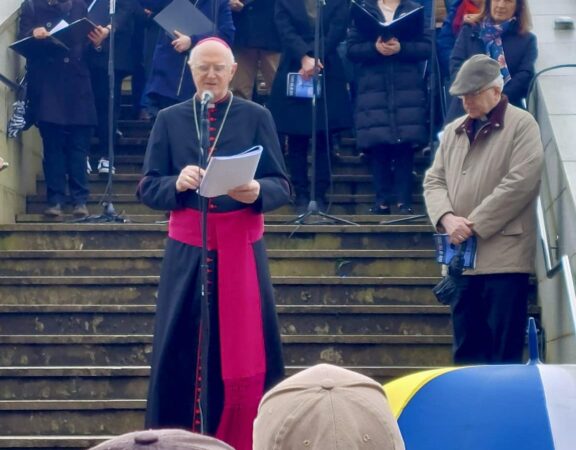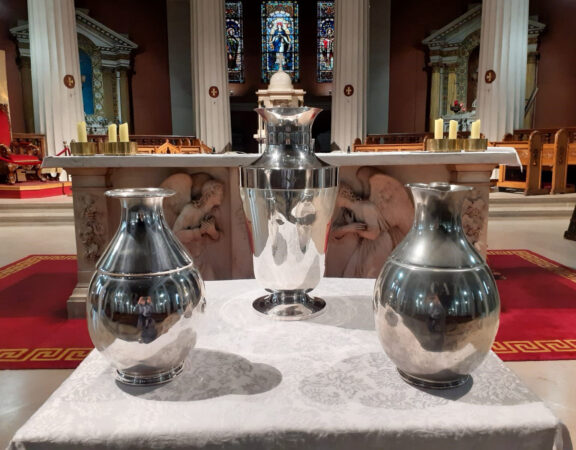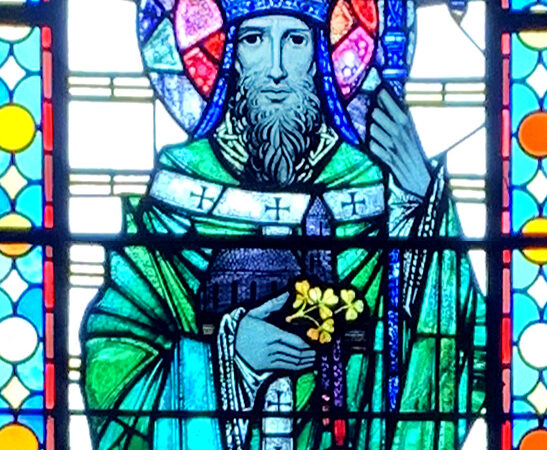ORDINATION TO THE PRIESTHOOD OF ROBERT SMYTH
Homily notes of Most Rev. Diarmuid Martin, Archbishop of Dublin
Saint Mary’s Pro-Cathedral, 29th June 2018
Solemnity of Saints Peter and Paul
“The Gospel reading for this Feast of Saints Peter and Paul is a very apposite one as we reflect together on the ordination to the priesthood in the service of the Archdiocese of Dublin of our friend Robert Smyth. The Gospel reading is appropriate also as we reflect on the nature of ministry in the Church and indeed on how all of us are called to live our Christian faith today.
The question that Jesus asks of his disciples is still a vital question. “Who do people say that Son of Man is? Who is Jesus Christ? What does Jesus mean to me? What does Jesus mean in our modern societies?
We know that there are many answers today just as there were at the time of Jesus. Even Jesus’ own disciples were hesitant about answering the question. In our time, we have had Jesus portrayed as Superstar; years earlier there was a series of memorable and highly emotional colossal movies on the life of Jesus.
People go about addressing the question of who Jesus is in other ways. How often do we hear people ask the question “What would Jesus do in this situation?” It is a valid question but often really a rhetorical question. Many of those who ask the question already have the answer ready and it is most often an answer based on their own subjective positions.
Where do we find the key to enter into the search for the real identity of Jesus? This is a key question for you Robert as you initiate your mission called as a priest to act “in persona Christi”.
To act in persona Christi you must first know Jesus Christ. However, no one can ever say that they definitively know Jesus Christ. Knowledge of Jesus Christ requires an ongoing discernment in your own life. You must constantly attempt to know Jesus more deeply in the scriptures, in prayer and in the faith of the Church.
Jesus points out that Peter’s fuller understanding of the identity Jesus does not come from human sources but from his Father in heaven. It is this that allows Jesus to assign the role of foundation of his Church to a weak man.
Then and still today it is impossible to separate the search for the identity of Jesus from the Church that Jesus established. The identity of Jesus is to be found in the Church.
Can this be so? We know a Church that is marked by imperfection and is made up of sinful men and women. The history of the Church is marked by corruption, sinfulness, abuse, and disregard for men and women and even for the poor who are a special sign of the presence of Jesus among us. How many of our contemporaries repeatedly say that they believe in Jesus but they cannot believe in the Church?
Where do we begin to find the true identity of Jesus? The disciples and those they quoted were not far wrong by beginning with the prophets: Elijah, Jeremiah, and John the Baptist. Jesus is to be found not simply in contemporary culture but in the narrative of the history of salvation that challenges us to open our hearts to reflect on the constant loving kindness of God over generations. That loving kindness was especially visible when God’s people were unfaithful. God is the faithful one.
The God revealed in Jesus Christ is not a distant judge but the hand held out to rise us up when we fall to be fully the men and women created in God’s own image. The Gospel of Jesus Christ is not a burden but something that makes us free. An understanding of the Gospel that becomes perceived as entrapment is really a distortion of the Gospel.
Robert, as a priest, you are called to preach the Word of God and to celebrate the sacraments that are the visible signs of God’s power in our midst. God’s power however is not revealed in domination but in mercy. We know that none of us is really worthy to be a minister of Jesus Christ. You must conform yourself to Jesus in a way that is difficult in today’s world. The call to follow Jesus is a call that requires renunciation of self but which leads then to a fuller realisation of self in a new way. It is in losing our life that we discover life in its depth.
The priest who is called to offer sacrifice in the Mass must be the one whose life is marked by sacrifice. The way your life witnesses authentically to Jesus will obviously affect the effectiveness of our ministry. Yet the effectiveness of your ministry does not depend just on your efforts, but on how you allow yourself to be an instrument of the life-giving power of Jesus Christ.
The priest is one who is chosen and is anointed with a special mission. This does not mean however that the priest is set apart in a position of superiority within the Church. The priest teaches God’s people but he must also learn from the faith of the Church as lived out especially by the poor and the marginalized and those who witness to Jesus on the peripheries of the world of influence and power. The priest must strive to know Jesus not in order to feel that he can know Jesus better than others can but to realise above all that his ministry as a priest depends on the loving care of Jesus.
Pope Francis when asked in an interview early on in his pontificate who he was, he replied instantly that he was a sinner. Perhaps on reading that interview one might be tempted to think, “Well that is the sort of thing Popes feel they have to say”. For Pope Francis it is something else. It is a fundamental reflection on Christian identity. Recognition of oneself as a sinner is not about morose guilt and scrupulosity. Pope Francis realises in himself – and teaches us – that if each of us is a sinner then we can never show arrogance or a sense of moral superiority towards other sinners, especially those who find themselves trapped in the complex net of sinfulness. The sinner knows that people will return to the Lord not by being condemned but by being embraced by mercy and support.
Priesthood is a ministry of and within the Church. I am always struck in the rite of ordination that when the question about the worthiness of the candidate is asked that the answer in the first place is “after enquiry among the people of Christ” and only then “upon recommendation of those concerned with his training”.
The authenticity of the life of the priest is an authenticity that is verified within the life of the Church and not in terms of one’s own self-evaluation or popularity. The priesthood is a unique ministry but it must be exercised as a service within God’s people and within the shared faith and love that is present in God’s people.
The Church of Jesus Christ is a Church of communion. The early Church, as we read in the Acts of the Apostles, was marked by gathering and sharing. One of the characteristics of the Church of the future in Dublin will be that of different ministries working together for the mission of the Church in a changed culture. The second reading stressed that the message “must be proclaimed for all the pagans to hear”. I am not calling those whose belief differs from ours “pagans”, but the message of Saint Paul is clear. The message of Jesus must be proclaimed within a culture for which faith is for many alien.
Robert many will tell you that being missionary in today’s culture will be difficult. I say to you that this is a great moment to be a minister and a witness to Jesus and his Gospel. Society needs to hear the message of Jesus proclaimed authentically and lived authentically. May the Lord bless you and accompany you as today you generously respond to the call that you have received.” ENDS
Notes:
Robert Smyth (33) is from the Parish of Knocklyon. Having completed his Leaving Certificate at Coláiste Éanna, Rathfarnham, Robert went on to study Management Science and Information Systems Studies at Trinity College where he graduated with First Class Honours.
Robert spent the next six years working full-time as a Management Consultant at Accenture in both Ireland and the UK, specialising in IT Strategy. As his career progressed, he felt increasingly called to serve God as a priest. After several years of discernment, he began his priestly formation at St. Patrick’s College Maynooth where he completed a Higher Diploma in Philosophy at the neighbouring National University of Ireland. Having completed his studies in philosophy, he was transferred to the Pontifical Irish College in Rome where he completed a Baccalaureate in Sacred Theology at the Pontifical Gregorian University. He is currently engaged in further studies in Rome.
In the course of his training, Robert completed pastoral placements in a nursing home in Meath, a HSE facility for mental healthcare in Kildare, the chaplaincy at Mountjoy Prison, the chaplaincy at Dublin Airport, homeless services run by Crosscare in Dublin and by the Community of Sant’Egidio in Rome as well as the parishes of Wicklow, Rathnew, River Valley (Swords) and Drimnagh. He was ordained a deacon by Archbishop Martin in Rome in April of 2017.









